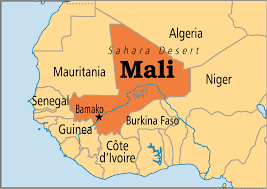APA – Bamako (Mali) – Responsibility for these killings is shared between jihadist groups and the Malian armed forces, according to a report by Human Right Watch.
In a document published on Thursday 2 November, the NGO Human Rights Watch lists at least 200 civilians killed in Mali since last April.
According to HRW, “the Malian armed forces and armed Islamist groups have killed and otherwise abused scores of civilians in central and northern Mali since April 20.”
It also called on the transitional authorities to urgently conduct credible and impartial investigations into the alleged abuses and hold those responsible to account.
To this end, the NGO has requested the assistance of the National Human Rights Commission and international human rights experts.
Since the beginning of April, Islamist fighters from the al-Qaeda-linked Support Group for Islam and Muslims (GSIM) have killed more than 160 civilians, including at least 24 children, according to HRW.
It also accused the Malian armed forces of being responsible for the deaths of at least “40 civilians, including at least 16 children, during counter-insurgency operations.”
The NGO also points out that the Malian government has not taken adequate measures to protect civilians in areas affected by the conflict.
“The targeted killings of civilians by armed Islamist groups and the Malian army constitute war crimes that must be thoroughly and impartially investigated,” says Ilaria Allegrozzi, senior Sahel researcher at Human Rights Watch.
“The Malian authorities should invite independent regional and international human rights experts to assist the Malian judicial authorities in holding those responsible for these serious crimes to account.”
To conduct this investigation, Human Rights Watch says it conducted telephone interviews in August and September with 40 people with knowledge of abuses by the Malian army and armed Islamist groups.
These included 33 witnesses to abuses, as well as members of Malian civil society groups and international organisations.
She also notes that on 9 October she sent letters to the Malian Ministers of Justice and Defence detailing her findings and asking questions about the allegations of abuse.
According to her, these letters have “remained unanswered.”
The NGO did not mention the case of the group “Islamic State in Grand Sahara” (EIGS), now known as “Islamic State in Sahel” (EIS).
However, this group is responsible for the deaths of dozens of civilians, particularly in the Ménaka region and part of Gao. It operates mainly in places located in the so-called “three borders” zone, or in the Liptako Gourma region, which brings together Mali, Burkina Faso and Niger.
On 16 September last year, these countries created a new platform called the Alliance of Sahel States (ASS). One of the aims of this initiative is to combat terrorism, which continues to ravage these countries and cause high levels of civilian casualties.
According to Armed Conflict Location & Event Data (ACLED), a crisis data collection, analysis and mapping project, violence against civilians in Mali increased by 38% between January and August, with the GSIM, the Malian armed forces, the Wagner group and the EIGS as the main perpetrators.
Since the end of August, the security situation in northern Mali has also deteriorated sharply following the resumption of hostilities between the rebels of the CSP-PSD, an alliance of armed movements involved in the peace process, and the Malian army.
This situation comes at a time when the United Nations Multidimensional Integrated Stabilisation Mission in Mali (MINUSMA), which was mandated to mediate between the warring parties, is preparing to withdraw from the country by 31 December at the latest.
However, all these crimes should not go unpunished, as Mali is a state party to the Rome Statute of the International Criminal Court, which has been investigating alleged war crimes committed in Mali since 2012.
Two Malians have already been tried by the ICC: Ahmad Al-Faqi Al-Mahdi, for the destruction of mausoleums in Timbuktu during the 2012 crisis, and Al Hassan Ag Abdoul Aziz Ag Mohamed Ag Mahmoud, who was transferred to the ICC on 31 March 2018 and charged with crimes related to his position as Islamic Commissioner of Timbuktu during the occupation of the city by jihadist groups in 2012 and 2013.
MD/ac/lb/as/APA


